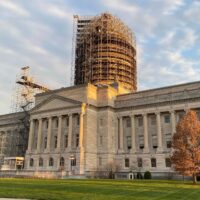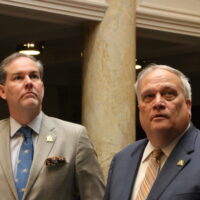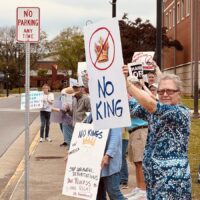A judge has temporarily blocked a new Kentucky law that allows businesses and schools to stay open during the coronavirus pandemic as long as they follow CDC guidelines.
The ruling comes a day after Democratic Gov. Andy Beshear sued to block three laws passed by the Republican-led legislature curtailing his powers during the coronavirus pandemic.
The order from Franklin Circuit Court Judge Phillip Shepherd only blocks parts of House Bill 1 that affect business and school openings. Other parts of the bill, including easing restrictions on long-term care visits and unemployment insurance taxes, remain in effect.
Shepherd wrote that he was concerned portions of House Bill 1 “could likely wreak havoc with public health.”
“Under the provisions of House Bill 1, it is likely that hundreds, or even thousands, of individual operating plans could be adopted, with no meaningful oversight or review, and with great variations as to the rules that would apply throughout the state,” Shepherd wrote.
“The Governor’s power — indeed, duty — to effectively enforce any uniform public health standards would be severely undermined, if not destroyed.”
Shepherd said the bill will be blocked for 30 days while the lawsuit transpires, unless he extends the order.
Following the ruling, Beshear issued a statement saying restrictions he’s used during the pandemic were “difficult but necessary.”
“I don’t use emergency powers because I want to. I use them because it is my duty to preserve the lives of Kentuckians,” Beshear said.
Republican leaders of the legislature made good on their promise to try and limit Beshear’s emergency powers after months of criticizing the governor’s handling of the pandemic.
During this year’s session, the supermajority GOP legislature has passed—and overridden Beshear’s vetoes of—six bills that change the governor’s powers or alter state government in a major way.
Beshear sued to block three of those bills, but Shepherd’s ruling only affects part of House Bill 1.
Blocked portions of the bill allow business and schools to stay open during the pandemic as long as they develop a plan that “meets or exceeds all applicable guidance issued by the Centers for Disease Control and Prevention,” or state government, “whichever is least restrictive.”
Beshear and Democrats have criticized the new law as being vague because it doesn’t specify which federal guidelines they hope businesses will follow.
Other parts of House Bill 1 remain in effect, including waiving penalties and interest on businesses’ unemployment insurance tax bills, and easing restrictions on foster care and long-term care visits.
Senate President Robert Stivers, a Republican from Manchester, issued a statement noting that the judge didn’t rule against the other bills Beshear is suing over.
“The denial of the restraining order and injunctive relief concerning Senate Bills 1 and 2 is the appropriate ruling. We want to look further into the restraining order and injunctive relief on House Bill 1 to better understand Judge Shepherd’s rationale. However, it is apparent from the court’s ruling that the majority of the actions of the General Assembly were within the law,” Stivers wrote.
Though Shepherd didn’t weigh in on Senate Bill 1 and 2, the measures also curb the governor’s emergency powers.
Senate Bill 1 limits the duration of the governor’s emergency orders to 30 days unless the legislature votes to extend them.
Senate Bill 2 gives the legislature more oversight of administrative regulations, another way Beshear has enacted emergency policies during the pandemic.






